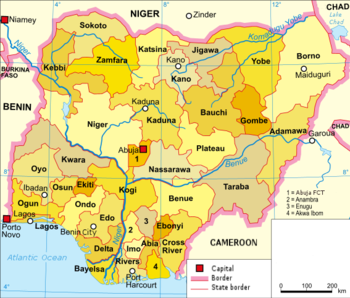
Back الصراعات الطائفية في نيجيريا Arabic Міжабшчынныя канфлікты ў Нігерыі Byelorussian Kommunale Konflikte in Nigeria German Rikicin gama gari a Najeriya Hausa Esemokwu obodo na Naịjirịa IG Conflitos intercomunitários na Nigéria Portuguese
| Communal conflicts in Nigeria | ||||||||
|---|---|---|---|---|---|---|---|---|
 Map of the 36 States of Nigeria | ||||||||
| ||||||||
| Belligerents | ||||||||
|
Adara, Berom, Jukun, Tiv and Tarok farmers |
Fulani and Hausa herders | |||||||
| Commanders and leaders | ||||||||
|
| ||||||||
| Casualties and losses | ||||||||
| 16,000+ people killed since 1998[1][2] | ||||||||
Communal conflicts in Nigeria[3] can be divided into two broad categories:[4][dubious – discuss]
- Ethno-religious conflicts, attributed to actors primarily divided by cultural, ethnic, or religious communities and identities, such as instances of religious violence between Christian and Muslim communities.[5][6][7]
- Herder–farmer conflicts, typically involving disputes over land and/or cattle between herders (in particular the Fulani and Hausa) and farmers (in particular the Adara, Berom, Tiv and Tarok).
The most impacted states are those of the Nigerian Middle Belt like Benue, Taraba and Plateau.[8][9][10][11] Violence has reached two peaks in 2004 and 2011 with around 2,000 fatalities those years.[12][13] It resulted in more than 700 fatalities in 2015 alone.[2][14][15][16]
- ^ "Social Violence Data Table". Connect SAIS Africa. Archived from the original on 29 June 2015. Retrieved 9 September 2015.
- ^ a b "ACLED Realtime data 2015". Archived from the original on 31 October 2015.
- ^ "Backgrounder: Communal conflicts in Nigeria". UCDP. 21 June 2012. Archived from the original on 22 December 2015. Retrieved 9 September 2015.
- ^ "Nigeria Social Violence Project Summary" (PDF). Connect SAIS Africa. Archived (PDF) from the original on 29 June 2015.
- ^ Agbiboa, Daniel Egiegba (2013). "Ethno-religious Conflicts and the Elusive Quest for National Identity in Nigeria". Journal of Black Studies. 44 (1): 3–30. ISSN 0021-9347.
- ^ "The Unending Cycle of Violence in Kaduna – THISDAYLIVE". www.thisdaylive.com. Retrieved 27 November 2022.
- ^ "Nigeria's Pernicious Drivers of Ethno-Religious Conflict". Africa Center for Strategic Studies. Retrieved 27 November 2022.
- ^ "KILLINGS IN BENUE, PLATEAU AND TARABA STATES". Archived from the original on 27 July 2015. Retrieved 9 September 2015.
- ^ "Understanding the Herder-Farmer Conflict in Nigeria". ACCORD. Retrieved 27 November 2022.
- ^ "Nigeria Middle Belt". ACAPS. Retrieved 27 November 2022.
- ^ "Environmental cooperation as a pathway to resolve Nigeria's deadly farmer-herder conflicts". UNEP. 4 October 2018. Retrieved 27 November 2022.
- ^ "Social violence in Nigeria". Connect SAIS Africa. Archived from the original on 26 June 2015. Retrieved 9 September 2015.
- ^ Olufemi, Alfred. "Horrors on the Plateau: Inside Nigeria's farmer-herder conflict". www.aljazeera.com. Retrieved 27 November 2022.
- ^ HAMID, BOBBOYI (2005). Peace - Building and conflict resolution in Northern.
- ^ "The forgotten farmer-herdsmen conflict in middle belt states Nigeria | MSF". Médecins Sans Frontières (MSF) International. Retrieved 27 November 2022.
- ^ Dhindsa, Tejas (15 September 2022). "Changing Dynamics of Conflict and Peacebuilding Among Farmer-Herder Communities in Nigeria's Middle Belt Region". Kujenga Amani. Retrieved 27 November 2022.
© MMXXIII Rich X Search. We shall prevail. All rights reserved. Rich X Search